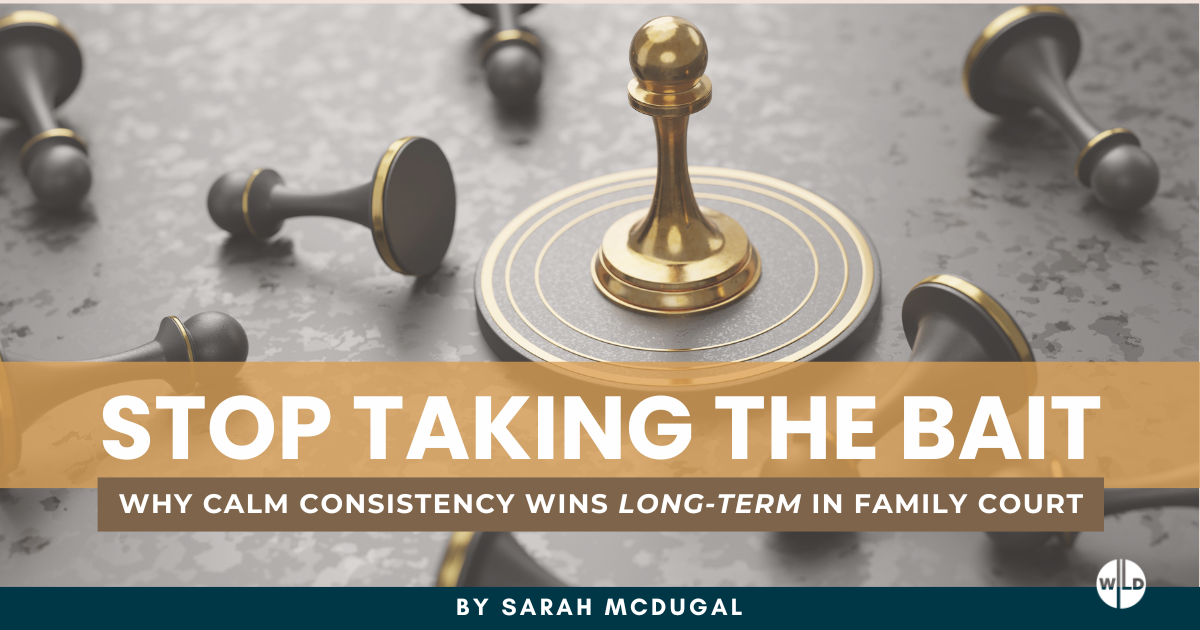Never miss a post.
When Your Ex Refuses to be a Responsible Co-Parent
- Sarah McDugal
- Tools
Q: How should I handle my ex’s ongoing lack of maturity and honesty with our kids? He refuses to take responsibility for his behaviors, his addictions, and his affairs. The kids have seen him act in these ways, and they’re not blind. He blows off his parenting time, is unpredictable and volatile, and they see it happening. Sometimes he comes in like an angel of light with grand gestures and sweeping compliments. Other times he cusses them out and breaks promises because he has a new flame or they're inconvenient to him. How do I stop obsessing over this? How do help my kids sort through the confusion? I refuse to lie to them or cover for him, but I don’t how how to guide my kids through the ongoing trauma. Help?!
This is just one of many messages from mamas who are picking up the pieces after their families have been shattered by abuse, addiction, adultery and/or abandonment.
It’s not uncommon for the abusive parent to refuse to take responsibility or own up to their destructive actions, leaving your children confused and bewildered as to which parent is telling the truth. It can be painfully challenging as a protective parent to figure out how to be truthful but not vindictive, honest but not angry, supportive but not enabling.
First, you — personally — have got to get yourself to the point where you can let go of your ex's irresponsible, immature, self-centered behavior.
Your frustration and emotional tensions run high because you’re still expecting him to act like an adult, pull his weight, pay child support on time, honestly report his income, show up for his kids, put their needs first, protect them from unhealthy influences, cooperate with medical and educational recommendations, focus on their safety, and all the other parenting things you faithfully do as an engaged and dedicated mom.
Let that expectation go.
If your marriage fell apart due to abuse, addiction, adultery — it’s not going to get better just because you’re on your own. If anything, it means he has even less motivation to hold himself accountable to doing what’s best for your kids.
You’re not in this position because of his penchant for maturity and responsibility. If those qualities were present, you'd probably still be together, right?
Stop letting yourself get angry because he is still being true only to himself.
Start by accepting these realities:
FACT: he cares for himself far more than he cares for his kids.
Period. If he cared well for his kids, he'd have been faithful to you, and sacrificially kind to the whole family. Don’t expect him to start now. (Oh, he might play a stunning rendition of Disney dad for a while. And yes, it will be confusing for your kids. But I’m talking about real authentic sacrificial parenting here.)FACT: he will do what is most convenient to his own whims.
Look at any given potential situation, and calculate the path of least resistance to his own desires. Expect him to take that path.FACT: he will blame you to the kids, and lie about the reasons you're no longer together.
If sexual sin or addiction or abuse is a factor in why your marriage dissolved, it is highly unlikely that he will take honest responsibility, admit his failures, or express authentic repentance to the kids. In these situations, the pattern of deception and blame-shifting is deeply entrenched. (He might make a big deal about “being different now”, but his actions and words won’t match long-term.) When the words and actions don't match, believe the actions.
Taking those facts into consideration, consider implementing these Do’s and Don’t’s as part of your ongoing co-parenting strategies:
DON’T grill your kids for specifics about their time with dad. It makes you look paranoid, and makes your kids feel like they’re expected to tattle between parents. That’s a horrible way to live. Don’t do it to them. If you already are, stop it now.
DON’T let your kids overhear adult conversations demeaning their dad, as much as possible. That’s not healing or healthy for them, and may cause them to internalize a sense of self-blame for things that were never their fault.
DON’T confide to them all the ways he’s hurt and betrayed you. If they keep asking you for more information, tell them plainly that there are some things you simply cannot discuss with them until they're over 18. If they want to make sure they can come back and ask you the question then, offer to write it down in a journal so neither of you forget.
DO tell them over and over and over and over again that if they are EVER scared, worried, or wondering whether something is right or okay, they can ALWAYS talk to you about it. Tell them (and live it out!) that you won’t ever be mad at them for telling the truth. Reassure them that they’re NEVER in trouble for talking to you about things that happen when they’re away from you: at school, with friends, on play dates, at dad’s house, at grandma’s house, anywhere…
DO pray for (and actively choose) a level of emotional disengagement that treats your ex as entirely peripheral to your daily life. You are required to communicate on essential facts and nothing more. Don’t get drawn in. Don’t argue. Don't try to persuade. Don't hyper-explain and justify your perspective. State your position. Be courteous and firm. Keep it to the facts.
DO use this season to teach your kids critical analysis skills. When they are confronted with any situation where someone is acting sketchy, don’t give them answers, ask them questions. “Does that seem right? Does that feel safe? Was that an honest way to respond? Is this what Jesus would want us to do? Was that showing good character? Did you observe integrity in this situation?” Use every day scenarios to practice analytical thinking. Help them notice tells and body language when someone is lying, manipulating, or deceiving. You can point these out in TV shows, movies, or real life surrounding situations. Make sure to stay focused on the principles and concepts; do not approach this topic in ways that sabotage your ex or other key family members.
DO emphasize to your kids their own power of choice and voice. When someone else is acting in ways that bother them — they have a choice! They are not captive to someone else’s actions. They can choose to do right. They can choose to be kind. They can choose to speak truth. Another person's choices don’t have to make them act badly. (And when they feel trapped in a situation that is simply too big for them to handle, teach them to breathe, be quiet and calm as possible, and wait until they get to a safe place to figure out how to handle it well.)
DO encourage your children’s sense of value and individual identity. This is especially important because as they get older and figure out that people they trust made some horrific choices, they will wonder if they are destined to turn out the same way. (This is especially common among little boys as they’re measuring their masculine identity by either how much they’re similar or different to their male relatives.) They need to know they’re not automatically guaranteed to repeat hurtful cycles made by the older generation. If they’re very young, this is NOT the time to have a direct conversation. But you can equip for healthy choice-making from as young as toddlerhood, by instilling a strong sense of their power to choose right in any given situation.
-
DO engage your kids in active conversations and regular roleplays on ways to handle uncomfortable or manipulative encounters with peers. Channel your desire to protect your little ones into neutral parenting conversations that empower them with tools to recognize and name poor behavior based on their own observations—in anyone, anywhere. Teach them to observe people’s behaviors all around them. Walk them through the thought process of what is right, good, truthful, and honorable. Help them see tricky patterns of behavior — which will be a helpful life skill forever.
DO give your kids accurate terms to identify toxic behaviors as soon as they are old enough. Help them recognize these in themselves, too. “Hey, kiddo, when you do something and your sister saw you do it and then you tell her it never happened… that’s called gaslighting. It makes her feel like she’s crazy and that makes her frustrated and distrustful toward you. It also makes you a liar in that moment. Don’t manipulate your sister!” Use real terms for sibling issues. Later, when someone else acts in that same behavior pattern… your kids will be better equipped to spot it and name it. Raise your children to not be helpless and gullible in the face of toxic manipulation.
Brass tacks… if you’re feeling obsessive about your ex's irresponsibility, lack of honesty, unreliability…. breathe.
He is doing his life his way, just like he always has.
He's highly unlikely to change that now.
You just keep doing yours.
Until you release your obsession over his refusal to be a mature partner, you’re allowing him to control you from a distance.
Don’t give him that power!
P.S. This is written for situations where your kids aren’t in immediate physical danger, but you’re wrestling with how to rise above the behaviors of your uncooperative, unrepentant co-parent. However, if your children’s safety and welfare are in jeopardy... don't wait to get legal advice on how to keep your babies safe, warrior mama.
go-to support hub for women ready to thrive
after traumatic stress from betrayal or abuse
Follow on Facebook and Instagram.
Subscribe on YouTube for hundreds of free videos on abuse recovery.
Browse my Best Books List to find safe resources on
betrayal trauma, healing, relationships, and more!
Divorce and custody court is ROUGH.
That’s why we’ve created PREPPED - a power-packed Crash Course equipping you to survive post-separation and litigation abuse!
These 14 game-changing units cover crucial aspects of your safety, strategy, and sanity as you pick up the pieces:
MAKING TOUGH CALLS | How to Plan Next Steps
DIVORCE PREP 101 | What You Need to Know
SECURE THE PERIMETER | Steps to Make You Safer
CO-PARENTING HORRORS | Ways to Protect Your Kids
PLUS, you'll get these three killer bonus tools:
6 Ways to Find the Best Divorce Attorney to Save Your Kids (eBook)
How to Craft a Winning Strategy for Your Divorce & Custody Battle (Guide + Workbook)
107 Questions to Ask Before You Hire a Divorce & Custody Attorney (Workbook)
Want more articles like this?
Get new posts straight to your inbox!



